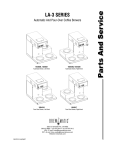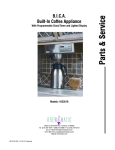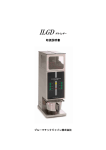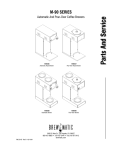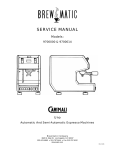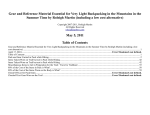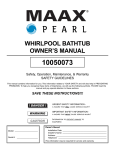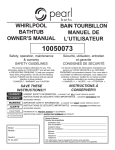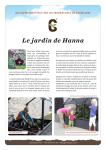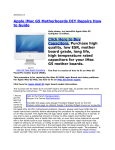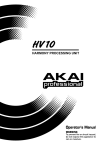Download Brewmatic 1033055 Service manual
Transcript
POUR-OVER COFFEE BREWER Models: 1033054, 1033058, 1033044 1033055, 1033059, 1033049 FM CS114 C 4/26/05 20333 S. Normandie Avenue, Torrance, California 90502 USA (310) 787-5444 • (800) 421 -6860 • FAX (310) 787-5412 USA E-mail: [email protected] Int’l E-mail: [email protected] Website: brewmatic.com PARTS AND SERVICE DIPLOMAT VI IMPORTANT INFORMATION FOR SERVICE PERSONNEL Read all instructions and safeguards included in the original packaging and in this service manual carefully and completely before installing, operating or servicing this appliance. Additional copies of installation instructions and service manuals are available upon request. The proper performance of service is essential for the safe and effective operation of this appliance. Repairs should be performed by qualified service personnel only. If you are unable to, or need help servicing this appliance, contact the nearest Brewmatic Authorized Service Agent or you can contact Brewmatic at 800421-6860. Only Authorized Replacement Parts Should Be Used. Part substitutions could create a fire hazard and the risk of personal injury. The use of replacement parts or accessory attachments not recommended by Brewmatic may be hazardous. Do Not By-Pass Any Safety Mechanisms Or Operate This Appliance Without Covers In Place. Brewmatic requires that all safety devices and covers are in place and functioning at all times to guard against a fire hazard and the risk of personal injury. Brewmatic Does Not Recommend, And Will Not Furnish Anyone With Information For Changing The Electrical Rating Of Any Appliance Manufactured Or Distributed By Brewmatic. Brewmatic will not approve of any unauthorized changes to the basic design of this appliance. Any modification or alteration to the appliance may create a fire hazard, may create a risk of personal injury, may void the safety listings and may void the warranty. Plumbing connections - All plumbing connections to water supply lines and drains should be performed by a licensed plumber complying with all applicable plumbing codes having jurisdiction. Electrical connections - With the exception of cords with plugs already attached, all electrical connections or alterations to the power supply should be performed by a licensed electrician complying with all applicable electrical codes having jurisdiction. When repairing or replacing internal electrical wiring, in part or in whole, use only terminals and wires with the same rating, gauge and insulation covering. When calling for information, parts or service, have the model number, serial number, voltage, wattage, phase and date of purchase available. Electrical information may be obtained from the electrical information nameplate located on the appliance. All procedures, diagrams and specifications contained in this manual are based on the latest information available at the time of publication. Information, parts and specifications are subject to change without notice. We assume no liability for any damage to person or property caused by the utilization of this publication to effect maintenance or repairs. Due to periodic reviews and changes in safety listing standards, listings and approvals may change at any time. For current listing and approval information contact Brewmatic. SPECIFICATIONS Model Number: Description: Volts: Watts: Amps: Hertz: Phase: Appliance Information 1030354, 1033058, 1033044 Diplomat VI, 2 Station Pour-Over Coffee Brewer 120 1480 12.3 60 1 Power Supply Cord: Plug: Power Supply Required: Wall Receptacle Required: Listings: Optional Accessories: Model: Description: Volts: Watts: Amps: Hertz: Phase: 1033055, 1033059, 1033049 Diplomat II, 3 Station Pour-Over Coffee Brewer 120 1570 13.1 60 1 6 ft., 2 wire + ground. 15 amp, 14 awg. NEMA 5-15P. Furnished and attached. 120 volts, 15 amp, dedicated circuit. NEMA 5-15R. Not furnished. UL 704J, NSF-4 1030801, 3 Station top cover with warmer. Additional Information Brewing Capacity: Brewing Temperature: Temperature Adjustment: Hi-Limit Thermostat: 60 oz. maximum. Approximately 188° to 192°F, maximum. Adjustable. 3 Increase. 4 Decrease. Manual reset. Not adjustable. 2 WIRING DIAGRAM OLD WIRING DIAGRAM FOR REFERENCE ONLY Models With A Secondary Hi-Limit Thermostat Models Without A Secondary Hi-Limit Thermostat 3 TROUBLE SHOOTING GUIDE READ AND FOLLOW THE CAUTIONS BELOW BEFORE ATTEMPTING TO SERVICE THIS COFFEE BREWER. CAUTION: Read and verify that the installation instructions have been followed before attempting to operate this appliance. Incorrect installation or operating procedures will void the warranty and may damage this appliance. Unplug the power cord before servicing, unless electrical testing is required. Be certain the power supply is of the correct rating and polarity before connecting the power supply cord. The chassis must be grounded to prevent possible electric shock. Failure to heed this warning may damage this appliance and may cause injury. Under no circumstance should the hi-limit thermostat be by-passed. In the event of failure the hi-limit thermostat should be replaced. Use only original or authorized replacement parts. Carefully inspect the internal wiring for wear or damage when servicing. Worn or damaged wiring may cause malfunctions and premature component failures. Replace any wires that have loose connections, damaged insulation or show evidence of overheating. When repairing or replacing internal electrical wiring, in part or in whole, use only terminals and wires with the same rating, gauge and insulation covering. Symptoms Solutions 1. The coffee brewer will not operate. The lights and warmers do not work, and the coffee brewer will not brew coffee. Make sure the power supply cord is connected to a proper, working wall receptacle. Make sure the "Power" switch has been turned on. Check the main circuit breaker in the building to see if it has tripped. Reset or replace the primary hi-limit thermostat. Check to make sure the internal wiring is correct. Inspect for loose, damaged or overheating wires or terminals. Repair or replace wiring as necessary. Test the "Power" switch. Replace it if necessary. Test the power supply cord. Replace it if necessary. 2. The coffee brewer will not brew coffee. The lights and warmers work, and the coffee brewer heats. Has water been poured into the brewer to initiate the brew cycle? Pour-in approx 60 oz. only. (See installation instructions for correct operating procedures) Check to make sure the internal wiring is correct. Inspect for loose, damaged or overheating wires or terminals. Repair or replace wiring as necessary. 3. The coffee brewer will not heat. The brew cycle and warmers work. The water for brewing is cold. Test the thermostat. Replace it if necessary. Reset or replace the primary hi-limit thermostat. Test the thermostat sensor. Replace it if necessary. Test the immersion element. Replace it if necessary. Check to make sure the internal wiring is correct. Inspect for loose, damaged or overheating wires or terminals. Repair or replace wiring as necessary. 4. The coffee brewer takes much longer than normal to heat. The lights and warmers work. Test the thermostat. Replace it if necessary. Test the thermostat sensor. Replace it if necessary. Test the voltage supply. The voltage supplied should match the voltage requirement on the electrical nameplate. Test the immersion element. Replace it if necessary. Check to make sure the internal wiring is correct. Inspect for loose, damaged or overheating wires or terminals. Repair or replace wiring as necessary. 5. Check to make sure the tank has been filled with water. See the installation instructions for filling procedures. Test the hi-limit thermostat. Replace it if necessary. Is the thermostat bulb in clip and attached to the immersion element? Reattach bulb if necessary. Test the brewing temperature. Adjust the thermostat if necessary. Inspect the wiring on the hi-limit thermostat for loose, damaged or overheating wires or terminals. Repair or replace wiring as necessary. The primary hi-limit thermostat keeps activating. WARNING Under no circumstance should the hi-limit thermostat be by-passed. In the event of failure, the hi-limit thermostat should be replaced. Use only original or authorized replacement parts. 6. The coffee brewer trips the buildings circuit breaker. Too many appliances are connected on one electrical circuit. The electrical circuits’ amperage rating is too low. Locate a correctly rated circuit or call an electrician to correct this problem. This coffee brewer may require a dedicated wall circuit or circuit breaker. Check the electrical specifications. Check to make sure the internal wiring is correct. Inspect for loose, damaged or overheating wires or terminals. Repair or replace wiring as necessary. Test the warmer elements. Replace if necessary. Inspect the immersion element for damage. Replace it if necessary. 4 Symptoms Solutions 7. The secondary hi-limit thermostat keeps activating. Test the hi-limit thermostat. Replace it if necessary. Inspect the hi-limit thermostat wiring for loose, damaged or overheating wires or terminals. Repair or replace wiring as necessary. Test the thermostat for proper temperature adjustment. The recommended temperature is between 188° and 192°F. Test below the brew cone with water only. Temperature higher than 192°F may cause the hi-limit to activate. WARNING: If the thermostat cannot be adjusted properly it should be replaced. The thermostat is calibrated at the factory and no attempt should be made to recalibrate it. Use only original or authorized replacement parts. 8. The brewing temperature is either too hot too cold. or Inspect thermostat bulb for excessive lime buildup. Is the thermostat bulb in clip and attached to the immersion element? Reattach bulb if necessary Adjust or replace the thermostat. Turn the adjustment screw clockwise to increase the temperature, counterclockwise to decrease. Turn the adjustment screw a maximum of 1/8 turn per adjustment. Retest and adjust again if necessary. The recommended temperature is between 188° and 192°F. Test below the brew cone with water only. WARNING: If the thermostat cannot be adjusted properly it should be replaced. The thermostat is calibrated at the factory and no attempt should be made to recalibrate it. Use only original or authorized replacement parts. Test the thermostat sensor with an ohmmeter. The sensor should read approximately 100,000 Ω at a normal room temperature of approximately 25c. As the heat to the sensor increases, the reading should decrease to zero. Inspect wiring for correct, loose or damaged wires or terminals. Test for correct voltage at the power supply. 9. The brewing cycle is too slow. Inspect and clean the spray head, siphon tube and reservoir down spout. Inspect and clean the brew cone 10. The beverage level is Inspect and clean the spray head, silicone tubing and siphon fittings. Inspect and clean the brew cone. 11. Water dripping from the spray head. Inspect and clean the spray head, siphon tube and reservoir down spout. Inspect and tighten siphon tube. Replace “O”-Ring if necessary. Test the brewing temperature. Adjust the thermostat if necessary. 12. Water leaking from unit. Inspect gaskets. Replace if necessary. Test the brewing temperature. Adjust the thermostat if necessary. Inspect housing for damage. 13. Warmers will not heat. Test warmer switch. Replace if necessary. Test warmer element. Replace if necessary. Inspect wiring for correct, loose or damage wires or terminals. 14. Poor tasting coffee. Inspect and clean brew cone, area above brew cone, spray head, siphon tube and reservoir down spout. Spray head must be in place for proper coffee extraction. Test brewing temperature. Adjust thermostat if necessary. Incorrect filter paper being used. Change amount of or brand of coffee being used. inconsistent. 15. Water overflows the filter paper. Grounds in coffee. Too much coffee being used. Decrease amount of coffee. Incorrect filter being used. Try another brand of filters. Two filters being used. Use only one filter for each brew. Fine grind coffee may cause overflow. Decrease amount of coffee used. If using fine grind coffee, use extended brew spray head. Inspect brew cone for damage. 5 CLEANING INSTRUCTIONS As necessary, the area between the cone slides and above brew cone should be wiped clean with a damp cloth as coffee oils will gradually collect on the surface directly above brew cone. The brew cone should be rinsed with water after each brew and, occasionally, washed by hand with a mild detergent. Rinse well after washing. Spray head should be cleaned regularly to prevent blockage. Use cleanout spring regularly to keep fittings and tubes clear. CAUTION: DO NOT USE CLEANSING POWDERS, HARSH DETERGENTS, CHEMICALS OR ANY OF THE "SUPER" CLEANERS. SOME OF THESE CLEANERS ARE CAPABLE OF DAMAGING THIS PRODUCT. READ INSTALLATION INSTRUCTIONS CAREFULLY FOR PROPER CLEANING PROCEDURES. Note: See instruction sheet for servicing and cleaning or deliming the Diplomat model coffee brewers. These instructions contain valuable information for preventing damage and extending the service life of these brewers. RECOMMENDATIONS FOR CLEANING AND SERVICING THE BREWMATIC DIPLOMAT VI POUR OVER AND AUTOMATIC BREWER Brewmatic is proud to announce that nearly one million Diplomats have been manufactured since it’s introduction. A very high percentage of these units are still in service. To maintain this service, Brewmatic continues to recommend a good preventative maintenance program. The Diplomat model coffee brewer will last for many years with proper maintenance and care. We would like to suggest the following as a guide for your consideration. I. MAINTENANCE 1. Plan a good preventative maintenance program. Periodic adjustments and cleaning will extend the life of the coffee brewer, assure quality coffee and satisfy customer needs. 2. All Diplomat models should be checked regularly for safety and cleanliness. 3. Know the location and age of all coffee brewers. Periodic refurbishing will extend the life of the coffee brewer and avoid the cost of emergency repairs. 4. Keep detailed records showing date and repairs that were required. Frequent repairs may indicate the need for refurbishing. 5. Check units on location periodically for alkali buildup, malfunction or damage. Clean spray head and siphon tube regularly to avoid emergency calls and assure quality coffee. II. REPAIR 1. Units with severe alkali buildup, malfunction or damage should be returned to your repair department for cleaning or repairs. 2. Instruct all repair personnel on how to test units and what to look for when cleaning or repairing them. 3. All units should be examined to make sure all components are functioning properly. If any damage or malfunction is apparent the component should be replaced. 4. Examine the power supply cord for evidence of damage or overheating. Replace cord if necessary. 5. Make sure the wall receptacle is in good condition and is properly grounded. Faulty wall receptacles can cause damage to the power cord and may damage the coffee brewer. 6. Make sure all units are grounded properly. 7. Make sure all internal wiring connections are tight and insulation is not cracked, frayed or showing evidence of overheating. Replace all damaged or overheating wires or terminals. When replacing wiring use only like rated terminals and wires of the same gauge and insulation covering. 8. If you are unsure of the condition of any component replace that component. The following components, due to their important function, require special attention. After repairs are completed these components should be tested thoroughly to assure that they function properly. The following is a brief description and a method for testing these important controls. WARNING: When replacing the thermostat or hi-limit thermostat do not crimp or squeeze capillary tube. Maintain a minimum 1/8" radius when forming capillary tube. Hint: Use the old thermostat bulb as a guide when forming capillary tube. A. THE REGULATING THERMOSTAT: 1. The regulating thermostat is not a fail-safe device. If this control fails the contacts will remain closed and electrical current will flow continuously to the immersion element. These controls are calibrated per our specifications and sealed at the factory. At no time should the seal be broken and an attempt be made to re-calibrate the thermostat. 2. Make sure all internal wiring connections are tight and insulation is not cracked, frayed or showing evidence of overheating. Replace all damaged or overheating wires or terminals. When replacing wiring use only like rated terminals and wires of the same gauge and insulation covering• 3. Make sure the thermostat bulb is in place on the immersion element with the clip attached as per diagram enclosed. 4. Test thermostat just after brew light comes on only. Temperature should be between 182° - 186°F, tested below the brew cone with water only. If necessary adjust thermostat and test again. WARNING: IF THE THERMOSTAT CANNOT BE ADJUSTED PROPERLY IT SHOULD BE REPLACED. TO IGNORE THIS WARNING COULD CREATE A FIRE HAZARD AND THE DANGER OF PERSONAL INJURY 6 B. THE HI-LIMIT THERMOSTAT: WARNING: NEVER BY-PASS THE HI-LIMIT THERMOSTAT. TO IGNORE THIS WARNING COULD CREATE A FIRE HAZARD AND THE DANGER OF PERSONAL INJURY 1. The hi-limit thermostat is a safety device designed to shut the coffee brewer off in the event of overheating. If it should fail to shut the coffee brewer off if it overheats, it should be replaced. This control is not adjustable. 2. Periodic testing should be performed to assure that the hi-limit thermostat is functioning correctly. 3. Make sure all internal wiring connections are tight and insulation is not cracked, frayed or showing evidence of overheating. Replace all damaged or overheating wires or terminals. When replacing wiring use only like rated terminals and wires of the same gauge and insulation covering. 4. Make sure the hi-limit thermostat bulb is in place on the immersion element with the clip attached as per diagram enclosed. 5. The hi-limit thermostat can be checked by dry firing the unit. Only a qualified person (one with coffee brewer repair experience) should attempt this test. 5a. First, turn off the master power switch and unplug the power supply cord from the wall receptacle. Allow the coffee brewer to cool. Remove the top cover and reservoir tray. Drain the water out of the unit and perform a visual inspection of all components and wiring. Make all necessary repairs. 5b. Remove thermostat bulb from its clip and keep the bulb away from the immersion element during the test. BEFORE PROCEEDING WITH THE TEST MAKE SURE THE HI-LIMIT THERMOSTAT BULB IS IN PLACE CORRECTLY. WARNING: DO NOT LEAVE THE COFFEE BREWER UNATTENDED DURING THIS TEST. 5c. Plug the power supply cord into a proper power supply and turn the master power switch on. The immersion element will begin to heat. Within approximately 1 minute, the hi-limit thermostat should click and pop out the reset button and all power to the coffee brewer should be interrupted. Note: When the hi-limit thermostat activates, the unit will shut down and all lights will stop glowing. CAUTION: DO NOT LEAVE THE COFFEE BREWER ON OVER THE RECOMMENDED TIME LIMIT DURING THE DRY FIRE TEST. IF THE HI-LIMIT THERMOSTAT DOES NOT SHUT THE COFFEE BREWER OFF AFTER THE 1 MINUTE RECOMMENDED TEST PERIOD, UNPLUG THE POWER SUPPLY CORD, ALLOW TO COOL AND REPLACE THE HI-LIMIT THERMOSTAT. DO NOT BY-PASS THE HI-LIMIT THERMOSTAT. IF IT SHOULD FAIL IT SHOULD BE REPLACED. USE ONLY ORIGINAL REPLACEMENT PARTS. PART SUBSTITUTION COULD CREATE A FIRE RISK AND THE DANGER OF PERSONAL INJURY 5d. Unplug the power supply cord and turn all switches to the off position. 5e. To reset the hi-limit thermostat pour two decanters of cold water into the water compartment. The cold water will cool down the hi-limit thermostat bulb and the immersion element. After approximately two minutes you can push in the red reset button located on the rear of the housing. 5f. Replace the thermostat bulb in its clip and attach the clip to the immersion element. Make sure that the hi-limit thermostat bulb is still in its clip and attached to the immersion element. 5g. Replace the reservoir and the top cover. WARNING: DURING THIS TEST, REMEMBER, DO NOT STAND IN WATER AND MAKE SURE YOUR HANDS DO NOT GET WET. DO NOT PLACE YOUR HANDS, OR ANY PART OF YOUR BODY, ON EXPOSED WIRING OR ANY COMPONENTS THAT ARE ENERGIZED. CAUTION SHOULD BE TAKEN TO AVOID ELECTRIC SHOCK. III. CLEANING To extend the life of your Diplomat coffee brewer we suggest that regular cleaning be included in your preventative maintenance program. The following recommendations will help to assure trouble free operation for years to come. 1. Check units on location periodically for alkali buildup, malfunction or damage. Units with severe alkali buildup, malfunction or damage should be returned to your repair department for deliming or repairs. 2. Clean spray head and siphon tube regularly to avoid emergency calls and assure quality coffee. 3. Clean all external surfaces regularly. A clean coffee brewer not only makes a better cup of coffee but also presents a better image of your service. 4. Abide by all regulations and safety precautions when using harsh chemicals or acids for cleaning. Do not use harsh abrasives as they may damage the finish of the Diplomat coffee brewer. Do not allow cleaners to touch the porcelain pans. Some cleaners may discolor or damage the porcelain finish. For a list of products that may be used to clean the Diplomat see pages 8 & 9 of recommended cleaners and recommended dilutions that are safe to use on the Diplomat plastic parts. Remember, a wear and tear factor is present on everything that we use. With proper care and cleaning these coffee brewers should provide you with years of reliable, trouble free service. This literature is provided for general service and cleaning only. For more detailed information on service please refer to the appropriate service manual. If you have any questions please feel free to contact the Brewmatic Customer Service Division at 800-421-6860. 7 PRODUCTS FOR USE ON THE DIPLOMAT HOUSING Failure to follow these cleaning recommendations may damage the Diplomat coffee brewer. Brewmatic recommends that the thermostat, hi-limit thermostat and immersion element be removed from the coffee brewer before cleaning. Do not use any harsh abrasives as they may damage the finish of the Diplomat coffee brewer. Do not allow cleaners to touch the porcelain pans. Some cleaners may discolor or damage the porcelain finish. When using harsh cleaners and acids, it is recommended that the product be used only long enough to loosen alkali. Acids and harsh cleaners may deteriorate the platting on immersion elements, thermostats and hi-limit thermostats. Under no circumstances should cleaners be left in the machine overnight. Use only the product brand names and dilutions that are listed. If the cleaner you are using is not listed discontinue use immediately and start using a product that is on the list. The following is a list of those products and chemicals that have been tested and shown to be safe or "nonaggressive" when used on the Diplomat plastic parts. ACID BASE CLEANERS: Acetic Acid: (Brewmatic recommends for periodic maintenance.) Citric Acid: (1 oz. to 32 oz. of water) Muriatic Acid: (1 oz. to 20 oz. of water) Nitric Acid: (1 oz. to 20 oz. of water) Phosphoric Acid: (1 oz. to 20 oz. of water) Heavy Duty Acid Cleaner: (1 oz. to 20 oz. of water) Intech 52: (Without anti- foam agent.) (1 oz. to 40 oz. of water) LX 453: Scale X Plus: (Care products) Rockline Automatic Coffeemaker Cleaner: WARNING: FOLLOW ALL REGULATIONS WHEN USING ACID BASE CLEANERS. WARNING: USE APPROPRIATE SAFETY PRECAUTIONS WHEN USING ACID BASE CLEANERS. WEAR SAFETY GOGGLES AND RUBBER CLOTHING. DELIMING CLEANERS: Coffee Clean: Dy-Lac: LIM N-8LF: (National Labs) Scale-Gon: (Calgon Vestal) Sparkle: (Banner Labs) Spray Clean: Squeak N' Clean: Stay Clean: Super Dilac: Superior Urn Cleaner: Super Take Off: Zep 40: (1 oz. to 10 oz. water) (1 oz. to 3 oz. water) (1 oz. to 1 Gal. water) (3 oz. to 1 Gal. Water) (1 oz. to 10 oz. water) STAINLESS STEEL CLEANERS: RETAIL PRODUCTS: Ajax Liquid Dishwashing Detergent: Calgon Liquid: Fantastik: Glass Wax: Ivory Liquid Dishwashing Detergent: Kleen N' Shine: Lemon Fresh Joy: Liquid Joy Detergent: Palmolive Dishwashing Detergent: (1 oz. to 20 oz. of water) (1 oz. to 20 oz. of water) (1 oz. to 20 oz. of water) (1 oz. to 20 oz. of water) (1 oz. to 20 oz. of water) MISC. ITEMS: Stainless Steel Cleaner: (Calgon Vestal) Baby Oil: Denaturated Alcohol: Distilled White Vinegar: Isopropyl Alcohol: Lemon Oil Polish: (Gulf) Mineral Oil: Paint Thinner: RTV 731 Adhesive Sealant: Shimmer Aerosol: 732 Silicone Rubber Sealant: 8 (Johnson's) (Brewmatic recommends for exterior polishing.) (Heinz) (Brewmatic recommends for light cleaning.) The following list of products have been tested and found to be harmful or “aggressive” to the Diplomat plastic parts, and should not be used. Acetone: Institutional Cleaner: Armour-All: Isopropanol: Basic H: (Shaklee) Jubilee: (Johnson's) Bio-90 Lime-A-Way: Carbon Tetrachloride: Lime Shine: (National Labs) Chromic Acid: Lime-Solv: Continental All Purpose Cleaner: M E K (Methyl Ethyl Ketone): Cromac: Nickel Safe Deliming Solution: (Calgon Vestal) Cromac #736: Pledge: Dawn Liquid Dishwashing Detergent: Pot Shot: Deep Gloss Stainless Steel Cleaner: (Johnson's) Sheila Shine: DeLimer: (Kay Chemical Co.) Simple green: Deliming Solution: (Dichem Chemicals) Sulfuric Acid: Ethyl Acetate: Toluene: Farmer Brothers Urn Cleaner: Trichloroethane: Gasoline: Turpentine: Green Cleaner: (Danamark) WD-40: Green Delimer: (Danamark) Whirl: Husky Degreaser: (Care Products) Windex: Hydrochloric Acid: Zep-Lac 45: Or any product containing petroleum distillates: These products have been tested specifically at the temperature and molded stress levels of our application. We are sure that there are additional products that are non-aggressive when used as we are sure there are additional products that are aggressive when used. Therefore we do not recommend the use of any product unless it has been thoroughly tested. NOTE: When using stainless steel cleaners (spray or hand cleaners) on stainless steely make sure overspray does not come into contact with the plastic housing. 9 PARTS DIAGRAM & PARTS LIST Final Assy., - Exterior View Diplomat VI Pour-Over Item No. 1 2 3 4 5 Part No. Description 1039027 1040062 9003131 6000282 1030856 Cover, Kit. (Includes Cover & 2 Hinge Inserts) Hinged Insert Screw, #6-32 x 1-3/4” Gasket, Top Cover Top Cover Assy., 2 Station (Includes Cover & 2 Hinge Inserts) Top Cover Assy., 3 Station (Complete) (See pager 11 for additional information) Housing Assy., (Complete without reservoir) Nut, Hex #6-32 Wrap Sheet, S/S Channel, Wire Element Pan Assy., (See page 10 for parts list) Brew Cone, Plastic Stove, Shell Washer, Lock #6 Screw, #6-32 x 1-1/4" Foot, Black 1/2" 1030801 6 7 8 9 10 11 12 13 14 15 1040592 9205104 1030711 1030439 6003091B 6000225 6000481 9303119 9001228 9906472 Also Available: 16 9919445 Clean-Out Spring PARTS DIAGRAM & PARTS LIST Element Pan Assy. Item No. 1 2 Part No. 6001020 6001007 1039032 3 4 5 6 7 8 9 10 11 6000578 6004021 9303115 9010115 9001107 9905350 9301106 9303118 9201145 Description Porcelain Pan, Black Porcelain Pan, Brown Warmer Element Kit, PTC (Includes items 2, 3, 5, 7, 8, 9, 10 & 11.) Spacer, Element Bracket Washer, Lock, 5/16” Screw, Hex Head, 5/16” – 18 x 3/4” Screw, #8-32 x 1/2” Eyelet, Anti-Rotation Washer, #10 Washer, Lock, #8 Nut, Hex, #8-32 10 PARTS DIAGRAM & PARTS LIST 3 Station Top Cover Assy. 1030801- (See instructions below) Item No. 1 2 3 4 5 6 Part No. 1030993 6000282 1039027 1040062 9003131 9919461 1039080 7 8 9 10 11 12 13 14 15 16 17 18 6001007 1039037 6000582 1030445 9303115 9010121 9001107 6000590 9303118 9201145 9906398 9005135 Description Top Cover, 3 Station (Without Warmer element, with cover & 2 hinge inserts) Gasket, Top Cover Cover, Kit (Includes cover & 2 hinge inserts) Hinge Insert Screw, Flat Head #6-32 x 1-3/4” Switch, Rocker Amber (To replace a switch that has 3 terminals) Switch, Rocker Kit Red. (Replaces 9919348) (To replace a switch that has 4 terminals) Porcelain Pan (Without warmer element) 3 Station Element Kit (Includes items 9,10,11,13,14,15,16) Spacer, Large Reflector Plate Washer, Lock W/Int. Tooth 5/16” Screw, Hex Hd. 5/16 –18 x1/2” Screw, #8-32 x 1/2" Spacer, Small Anti-Rotation Washer, Lock #8 Nut, Hex #8-32 Fastener, On-Sert Screw, #6x 3/8” 1030801 - 3 Station Top Cover- Installation Instructions WARNING: Read these instructions completely before continuing. Unplug the appliance and allow to cool before attempting to install this top cover. Incorrect installation or operating procedures will void the warranty and may damage this appliance. This appliance must be electrically grounded to prevent electric shock or injury to the operator. 1. Remove the existing top cover. If there are any wires connected to the top cover, remove them. 2. Determine the type of switch the new top cover has, and use the appropriate diagram below when attaching the wiring from the new top cover. 3. Attach the white wire (#1 on the diagram below), from the new top cover to the group of white wires on the immersion element. 4. Attach the black wire (#3 on the diagram below), from the new top cover to the group of black wires on the thermostat terminal #2. There should be a terminal available for this connection. 5. Attach the green wire (#2 on the diagram below), from the new top cover to the ground screw on the immersion element. 6. Place the top cover on top of the housing, making sure the channels in the top cover line up with the housing edges. Tap firmly on each corner of the top cover to snap the cover in place. Install the top cover screw and tighten snug only. Test thoroughly. Note: See the wiring diagram on the inside of the coffee brewer for complete wiring details. 1039080 – Switch, Red 9919461 – Switch, Amber Switch with 4 terminals Switch with 3 terminals 11 PARTS DIAGRAM & PARTS LIST Housing Assy., Diplomat VI Pour-Over Item No. 1 2 3 4 5 6 7 8 9 10 11 12 13 Part No. Description 1040591 6000514 1040045 1039028 9915144 9202122 1040142 9905266 9001229 6000274 6000648 9301201 9201113 Housing, Diplomat VI (Housing Only, no controls) Mid-Hex Screw, #6-32 x 1/3” Hex Reservoir Siphon Tube Kit, Plastic (Includes items 5 & 6) “O”-Ring Nut, Hex 1/8”-27 Spray Head, Plastic Brown Immersion Element, 120V 1300W. Screw, #6-32 x 7/16” (was 9001226) Gasket, Immersion Element Bracket, Secondary Hi-Limit Washer, #6 Nut, Hex #6-32 *14 9920552 Hi-Limit Thermostat, (Secondary) (See page 13 for additional info & item #34 – 1039091 Secondary Hi-Limit Kit) 15 16 17 9001244 9303128 9201128 Screw, #4-40 x 1/4" Washer, Lock W/Int. Tooth #4 Nut, Hex #4-40 **18 9920434 Thermostat (See page 14 for additional info & item #35 - 1039104 Thermostat Kit) 19 6000363 Clip, Thermostat Bulb 20 9920459 Hi-Limit, Thermostat (Main) (See pages 13 for additional info) 21 22 23 24 25 26 27 28 29 30 31 32 33 9001136 1040010 9914285 6000364 9902363 9005146 9902361 9903435 9001142 9303118 9201152 9919452 9919451 Screw, #6-32 x 1” Spacer, Hi-Limit Thermostat Nut, Push-On Tinnerman #6 Clip, Hi-Limit Thermostat Bulb Terminal Block Screw, Tapping #6 x 5/8” Bushing, Strain Relief Cord. Power Supply Screw, #6-32 x 7/8” Washer, Lock W/Int. Tooth #8 Nut, Hex #6-32 Switch, Power With Brew Light Switch, Double Warmer Available: 1039091 *34 Kit, Secondary Hi-Limit Thermostat (Kit includes items 11, 12, 13, 14, 15, 16 & 17) **35 Kit, Thermostat Change (Replacement of 9920450 Thermostat to 9920434 Thermostat) 1039104 12 THERMOSTAT BULB DIAGRAM Proper Positioning of The thermostat And Hi-Limit Thermostat Bulbs Top View Right Side View From Inside of Housing WARNING The thermostat and high limit thermostat bulbs must be correctly positioned in their clips and installed correctly on the element for proper operation and safety. SECONDARY HI-LIMIT THERMOSTAT If the coffee brewer should overheat, the main hi-limit will turn the entire coffee brewer off. If the main hi-limit fails to turn the entire coffee brewer off, the secondary hi-limit will turn the main heating element off. To assure correct operation and safety, the entire sensing surface of the secondary hi-limit must make contact with the center wall of the housing. If the sensing surface is not making correct contact, adjust the mounting bracket until correct contact is made. UNDER NO CIRCUMSTANCE SHOULD THE HI-LIMIT BE BY-PASSED. IN THE EVENT OF FAILURE, THE HI-LIMIT THERMOSTATS SHOULD BE REPLACED. USE ONLY ORIGINAL AUTHORIZED REPLACEMENT PARTS. 13 THERMOSTAT CHANGE FOR KIT #1039104 TO REPLACE 9920450 THERMOSTAT WITH 9920434 THERMOSTAT FOR ALL DIPLOMAT VI MODELS ONLY Instructions: NOTE: Refer to attached wiring diagram before proceeding with instructions 1. Disconnect all wires from old thermostat #9920450. (Remove and discard old thermostat) 2. Remove thermostat capillary tube from immersion element. 3. Remove and discard white neutral wire which connects between terminal #6 and terminal #3 on power switch #9919452. 4. Mount the new thermostat and attach capillary tube (bulb) to immersion element. 5. Take the orange wire originating from power switch #9919452 (terminal #1), and black wire originating from secondary hi limit #9920393 and connect both wires on terminal #1 on thermostat #9920434. 6. Connect one end of the black wire provided in kit to terminal #3 on power switch #9919452. Connect the opposite end of the black wire to terminal #2 on thermostat #9920434. Reconnect existing wires to terminal # on thermostat #9920434 according to the wiring diagram. 7. Attach appropriate wire decal to machine. Note: The kit provides wire decal for Dip VI Pour-Over and Dip VI Automatic. Included items in kit: 1 - 9920434 Thermostat 1 - 1031375 Wire Assy. Kit 1 - 1040951 Decal, Wire Diagram Pour-Over 1 - 1040952 Decal, Wire Diagram Automatic 1 - 9904236 Adjustment Decal WIRE DIAGRAM FOR KIT 1039104 Wire Diagram for Diplomat VI Pour-Over Wire Diagram for Diplomat VI Automatic 14 20333 S. Normandie Avenue, Torrance, California 90502 USA (310) 787-5444 • (800) 421 -6860 • FAX (310) 787-5412 USA E-mail: [email protected] Int’l E-mail: [email protected] Website: brewmatic.com















